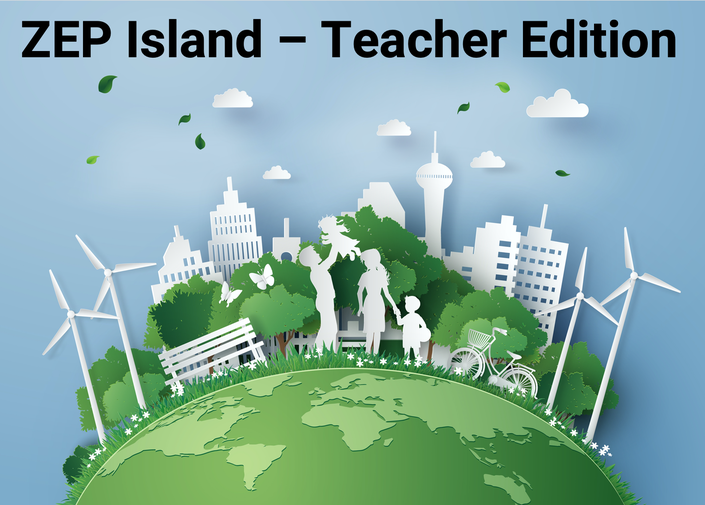
ZEP Island - Teacher Edition
The goal of ZEP Island is to learn what it would take for each of us to get to zero CO2 emissions, and along the way cover a wide range of fascinating and important curriculum topics, and develop key employability skills.
The course starts with a Climate Change Primer which explains global warming, why it is happening and what the consequences of inaction are. Students will learn why human-caused CO2 emissions have to get to zero by 2050 to avoid dangerous and unpredictable climate-related consequences.
Positive impacts require planning, so the next section sets out the planning and design requirements for the project, the role of planning and design in tackling complex problems, and explores why it’s important to design before you build.
Using technology in a smart way is a key way in which we can mitigate against climate change, and the next section is about using sensors, coding and control systems including the BBC micro:bit.
At the heart of the project is learning about the key ingredients for life on Earth and designing and building systems to produce:
- Clean water
- Sustainably produced food
- Clean energy
- Sustainable shelter
In designing and building each of these subsystems students will learn about pressures on the natural environment; the consequences of global warming; big ideas to mitigate against climate change; and what it really takes to sustainably support a human being on Earth.
Throughout the project students will develop practical skills including planning, ideation, communication, collaboration, design and construction.
By the end of this project, students will have:
- Learned how to calculate, experiment, design and make
- Developed communication skills using multiple media formats
- Understood what it takes to sustain human life
- Applied concepts, knowledge and skills from the following subject areas:
- Biology
- Chemistry
- Physics
- Mathematics
- Design and Technology
- Computing
- Engineering
- Geography
- Reflected on the learning process through the production of a design portfolio
- Built a fully functioning working model
The course is designed to be self-contained - a student following the text, diagrams, videos and links should be able to leverage the content to become self-sufficient learners. Between them, teams should be able to make sense of the tasks as they are set out in the course material.
Your Instructor

Mike’s passion is to simplify Deep Tech to enable organisations grow, and help people to learn.
In September 2013, after a long and successful career at Microsoft, Mike founded what was to become learn-tech.io - a company dedicated to democratising Deep Tech, and helping people develop technical, scientific, mathematics, engineering and business knowledge and skills. learn-tech.io now has customers for its products and services in UK, Singapore, China and Australia.
Mike started his career in automotive engineering, spent 10 years teaching and at Secondary and University levels, then worked at Microsoft for 13 years before founding his current business. His experience spans the full spectrum of technology - from AI to Zero Emissions solutions.
Learn-tech.io provides custom learning and technology solutions to organisations such as Pearson, Intel, Microsoft, ARM, BBC, Singapore Science Centre, RM Plc, Box Hill Institute, Burges Salmon and the Bristol Technology and Engineering Academy.
The learn-tech.io organisation includes partners in Asia, and “Deep Tech Task Force” - a team of interns focussed on simplifying a wide range of aspects of Deep Tech from Neural Networks, to FinTech, to Law and Public Policy.
Mike is the author of the “AI Demystified” and “How to Make a Mind?” courses. He has delivered keynote speeches across the world on a range of technology related subjects and has worked at senior level in over 30 countries.
